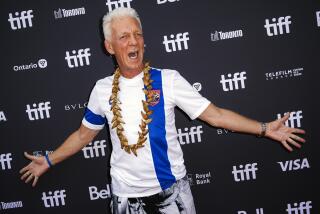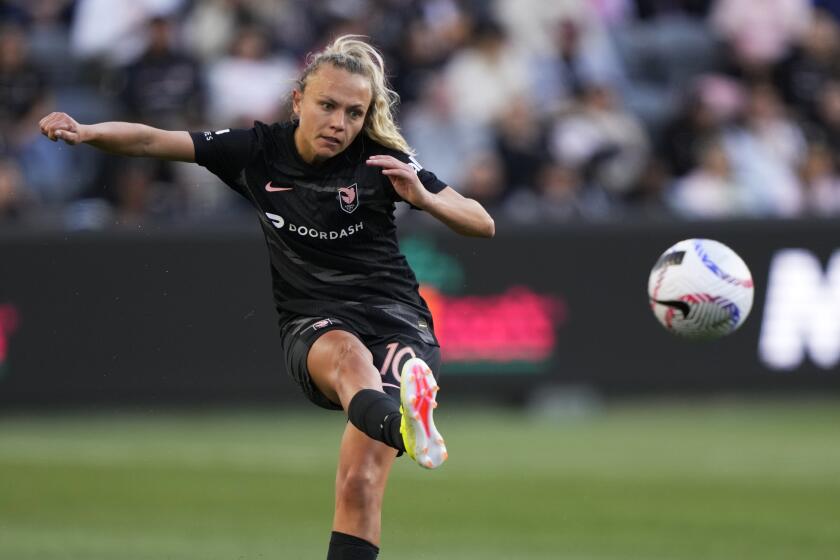FIFA politics play out as U.S. vies to host 2022 World Cup
Can Germany’s Franz Beckenbauer, who spent several enjoyable years in New York playing for the Cosmos, be counted on to vote for the U.S.?
Would France’s Michel Platini, whose youthful North American adventures included playing in the 1976 Montreal Olympics, be considered in the Americans’ corner?
What about England’s Geoff Thompson? Would he support the U.S. 2022 World Cup bid despite the fact that his American FIFA colleague, Chuck Blazer, is cozying up to Russia, England’s main 2018 rival?
Intrigue is everywhere. Speculation is rife. Strange stories abound.
But all that really matters now is how FIFA’s executive committee votes when it meets in Switzerland on Thursday to decide which countries will stage the World Cup in 2018 and 2022.
What will it take to garner enough votes?
Despite rumors, reports and rumblings to the contrary, the answer is not bribery. At least not in any manner that is easily verifiable.
Sure, two members of the 24-man executive committee have been suspended in recent weeks for allegedly being susceptible to the odd inducement.
And sure, FIFA has been chasing its tail ever since then in a probably futile effort to show that everything will be honest and aboveboard when the remaining 22 men gather in Zurich this week to hear final presentations from each bidder and to cast their ballots.
But no one really knows which way the votes will go.
Which country from among Australia, Japan, Qatar, South Korea and the U.S. has done enough to persuade at least 12 of those 22 to vote for it as 2022 host?
Which bidder from among England, the Netherlands/Belgium, Russia and Spain/Portugal has put together a campaign that will tilt the balance its way in the vote for 2018?
In each case, a majority is needed, so several rounds of voting are probable. The bidder with the fewest votes in each round will be eliminated.
The widespread belief is that 2018 will come down to England and Russia, with the 2022 scrap ending up between Qatar and the U.S. But that is guesswork and little more.
Coming into play just as much as the relative merits of the respective bids is the Machiavellian world of FIFA politics, with the organization’s president, Joseph “Sepp” Blatter, determined to remain in power for as long as possible.
But at least three executive committee members — Qatar’s Mohamed bin Hammam, South Korea’s Chung Mong Joon and Brazil’s Ricardo Teixeira — are positioning themselves to succeed Blatter and are using the twin votes as a way of building political alliances that will serve their needs down the road.
There is no guarantee that the most worthy bids will prevail. Deals are being struck, the corridors of power are filled with whispers, and the lobbying has grown increasingly intense and frantic.
Is it a coincidence, for example, that with South Korea seeking the 2022 tournament, the South Korean car manufacturer Hyundai, owned by Chung, just struck a lucrative deal with FIFA extending its World Cup sponsorship through 2022?
Is it a coincidence that the Spain/Portugal campaign has taken on new life with solid support from Asia and South America and now claims to have eight votes already in the bag, with only four more needed?
Is it a coincidence that Qatar recently staged a high-profile game between Argentina and Brazil in Doha and invited executive committee members Julio Grondona of Argentina and Teixeira of Brazil as honored guests?
Spaniard Angel Maria Villar Llona, guarantees Spain/Portugal one vote on the executive committee, but Qatar’s Bin Hammam, president of the Asian Football Confederation, has promised another and has said that “Asia supports the Iberian bid.”
If so, England and Russia might not be on as a firm a footing as they once believed. Spain, after all, gained a lot of international goodwill while winning the World Cup in stylish fashion in South Africa this past summer.
If Asia’s votes go to Spain/Portugal, will Spain’s vote, and some others from Europe, go to Asia, and in particular to Qatar, Bin Hammam’s homeland? If they do, the U.S. bid might not be the lock it appears to be.
Meanwhile, the assumption that the CONCACAF region’s three votes — by the United States’ Blazer, Trinidad and Tobago’s Jack Warner and Guatemala’s Rafael Salguero — would go to England for 2018 and to the U.S. for 2022 have been dented in recent weeks.
First, Salguero said he had not yet made up his mind, adding that the U.S. was only “a possibility.”
Then Blazer did something unusual even by the spectacularly bearded New Yorker’s standards. Here’s how England’s Independent newspaper described it on Friday:
“Blazer put up a fawning blog of his meeting with the Russian prime minister, Vladimir Putin, who will play a leading part in the Russian presentation. Blazer has also posted 20 photographs of Putin’s holiday in Siberia” on his personal blog.
The English take this to mean that Blazer’s 2018 vote might go Russia’s way, but no one knows for sure. Blazer is politically savvy enough to have successfully trodden his way through soccer’s international minefields for several decades, so another bit of fancy footwork would come as no surprise.
The 22 voters are an odd mix, ranging from such illustrious former players as Beckenbauer and Platini, to men who operate largely in international soccer’s shadows.
But until Thursday, everyone remains in the dark about their intentions.






